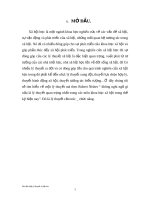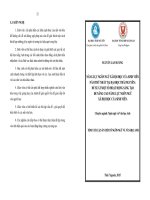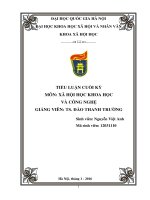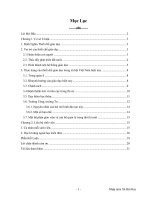TIỂU LUẬN NGÔN NGỮ XÃ HỘI HỌC
Bạn đang xem bản rút gọn của tài liệu. Xem và tải ngay bản đầy đủ của tài liệu tại đây (102.29 KB, 6 trang )
HUE UNIVERSITY
INSTITUTE OF OPEN EDUCATION AND INFORMATION
TECHNOLOGY ENGLISH LANGUAGE
SOCIOLINGUISTIC PROJECT
Lecturer: PhD.Trần Thuần
Student: Mai Văn Huy
Student’s code: 7052900490
Class: Nghệ An 6
Topic 2: Examine the differences between the English spoken in Boston and the
English spoken in the southern area of the United States. Why do you think there is
such dialectal evidence?
I. INTRODUCTION
The idea of writing about English dialects emerged first from my interest in
sociolinguistics and particularly the English language. Indeed, having fallen in love
with the language of Shakespeare since my childhood, the disparity of the way
English is spoken has always amazed me. At the beginning of my studies of this
wonderful language, hearing the English of a native speaker would puzzle me
because I would not figure out any word of the speech, which was odd, for the
speech of some native Black English speakers would sound familiar to me. Later,
thanks to sociolinguistics classes, I found out that regions and societies favor the
difference in the way a language is spoken. It immediately turned out to be a need
and a wish for me to explore the diversity of English dialects. One of the main
purposes of this study is to bring an enlightened view on the conception of dialects
in sociolinguistics. Given that, dialect is one of the most confusing terms in
sociolinguistics and it usually stands for a cause of disagreement even between
linguists. For example, it is very hard to delineate the concept of dialect and
language for they are not represented in a clear-cut way in the sense that one can
talk about American English and British English, but it is linguistically difficult to
say where people stop speaking American English and where they start speaking
British English. Besides, I chose to write on this subject to bring an answer to the
question of whether certain dialects are more valuable than others. Indeed, very
often speakers of certain dialects (especially the standard dialects speakers) are
thought to speak in a correct way while speakers of other dialects (generally the
non-standard users) are stereotyped as being vulgar and incorrect. Therefore, it
would be interesting to conduct a scientific survey to prove or refute these
common assertions. The hugeness of English and its adoption by new nations in
today’s world has rendered its varieties more complex. Because the more people
are regionally distant and socially different, the more the language is affected,
therefore it is worthwhile to classify the different ways it is spoken and identify the
very dialects, which compose the language.
Language is a fascinating and ever-evolving aspect of human
communication, shaped by the diverse cultures, histories, and geographical regions
in which it is spoken. Within a single language, such as English, we find a
multitude of dialects that exhibit unique linguistic features and variations. In the
United States, two prominent regional dialects that stand out are Boston English
and Southern United States English. These dialects not only differentiate
themselves from Standard American English but also from each other, reflecting
the distinct linguistic landscapes of their respective regions.
II. DIFFERENCES
The English spoken in Boston and the southern area of the United States
exhibit distinct dialectal differences. These variations can be attributed to several
factors, including historical, cultural, and geographic influences.
1.
Historical Factors:
The settlement patterns in these regions played a significant role in shaping
their dialects. Boston was one of the earliest English settlements in North America
and had a strong influence from the Puritans who migrated there in the 17th
century. Their speech patterns, vocabulary, and pronunciation left a lasting impact
on the local dialect, known as the Boston accent.
In the southern United States, the dialects have been influenced by various
historical events, such as the colonization of the region by English speakers from
different backgrounds. The settlement of the southern states was primarily driven
by English, Scottish, and Irish immigrants, who brought their distinct linguistic
features, contributing to the formation of unique dialectal characteristics.
2. Cultural Factors:
Cultural factors, including social norms, traditions, and interactions, can
also shape dialectal differences. In Boston, a long-standing emphasis on education
and intellectualism has influenced the local speech patterns. The prestigious
universities in the area, such as Harvard and MIT, have contributed to a distinct
accent associated with educated speech in the region.
In the southern United States, cultural factors such as a strong sense of
regional identity and a slower pace of life have influenced the local dialects. The
southern dialects often feature a slower and more relaxed speech tempo, as well as
distinct vocabulary and idiomatic expressions associated with Southern culture.
3. Geographic Factors:
The physical geography of an area can also contributes to dialectal
differences. Boston's location in the northeastern part of the United States exposes
it to the influence of other nearby dialects, such as the New York accent. The
proximity to major cities and transportation routes facilitates linguistic contact and
exchange, leading to shared features and influences between neighboring regions.
In the southern United States, the vast and diverse geography contributes to
regional variations in dialect. The Southern dialects differ between states and even
within different parts of the same state. This variation can be attributed to factors
such as settlement patterns, isolation due to geographic features like mountains or
swamps, and the historical presence of African American Vernacular English
(AAVE) in some areas.
The English spoken in Boston and the southern area of the United States
exhibit notable dialectal differences in terms of pronunciation, vocabulary,
grammar, and intonation. Here are some key contrasts:
4. Pronunciation:
Boston: The Boston accent is characterized by distinct vowel sounds, such
as the non-rhotic "r" (dropping the "r" sound at the end of words), the "aw" sound
becoming "ah" (e.g., "car" pronounced as "cah"), and the elongation of certain
vowel sounds.
Southern US: The Southern accent often features distinct vowel sounds,
such as the "a" sound becoming more nasalized (e.g., "cat" pronounced as "caat"),
the "i" sound becoming more diphthongized (e.g., "ride" pronounced as "rahed"),
and the presence of a "drawl" or a slower, elongated speech pattern.
5. Vocabulary:
Boston: The Boston dialect includes some unique vocabulary, influenced by
the city's history and cultural context. For example, "wicked" is commonly used as
an intensifier meaning "very," and "rotary" is used instead of "roundabout" to refer
to traffic circles.
Southern US: The Southern dialect has its own set of vocabulary,
influenced by regional history, agriculture, and cultural factors. Terms like "y'all"
(you all), "fixin' to" (getting ready to), and "bless your heart" (a phrase with
various meanings depending on context) are commonly heard in Southern speech.
6. Grammar:
Boston: The Boston dialect exhibits some distinct grammatical features,
including the use of the present perfect tense with "be" instead of "have" (e.g., "I
am done my homework" instead of "I have done my homework").
Southern US: The Southern dialect may include grammatical features such
as the use of double modals (e.g., "might could" or "might can" instead of "might
be able to") and the use of "fixing to" or "going to" interchangeably to express
future actions.
7. Intonation and Expressions:
Boston: The Boston accent often features a distinctive intonation pattern,
known as "Boston rising" or "High Rising Terminal," where statements end with a
rising pitch. Certain expressions and phrases are also characteristic of Boston
speech, such as "park the car in Harvard Yard" (to demonstrate the accent's unique
vowel sounds).
Southern US: The Southern accent is known for its melodic and slower pace
of speech. Expressions like "bless your heart," "y'all come back now, ya hear," and
"howdy" are commonly associated with Southern speech patterns.
The dialectal evidence between Boston and the southern area of the United
States can be attributed to a combination of historical, cultural, and geographic
factors:
8. Historical Settlement Patterns:
SubsequentEnglish settlement in Boston by Puritans and subsequent waves
of immigration from different regions shaped the unique Boston accent. In the
southern states, settlement by English, Scottish, and Irish immigrants, as well as
the historical influence of African American Vernacular English (AAVE),
contributed to the formation of distinct Southern dialects.
9. Cultural and Social Influences:
The cultural and social aspects of each region influenced the development
of their respective dialects. Boston's intellectual and academic focus, influenced by
the presence of prestigious universities, contributed to its distinct accent. In the
Southern US, the region's history, traditions, and social dynamics contributed to
the formation of a unique dialect that reflects the cultural identity and values of the
area.
10. Geographic Isolation and Interactions:
Geographic factors, such as isolation or proximity to other regions, impact
linguistic development. Boston's proximity to other East Coast cities, like New
York, allows for linguistic exchange and shared features. In contrast, the vast and
diverse geography of the southern United States, with its varying degrees of
isolation, has led to regional variations in dialect within the Southern accent.
III. CONCLUSION
In conclusion, the differences between Boston English and Southern
American English can be attributed to a combination of historical, cultural, and
social factors. The non-rhotic pronunciation and vocabulary influenced by Irish
immigration are distinctive features of Boston English. On the other hand,
Southern American English is characterized by rhoticity, vowel variations, unique
vocabulary, and grammatical patterns influenced by the colonial history, slavery,
agrarian society, and cultural values of the Southern region. Additionally, sociocultural factors, including higher education, working-class influence, deep-rooted
traditions, and the impact of African American culture, have contributed to the
development and preservation of these dialectal differences. Understanding and
appreciating these dialectal variations enhance our knowledge of the linguistic
diversity within the United States and the complex interplay between language,
history, culture, and society.









